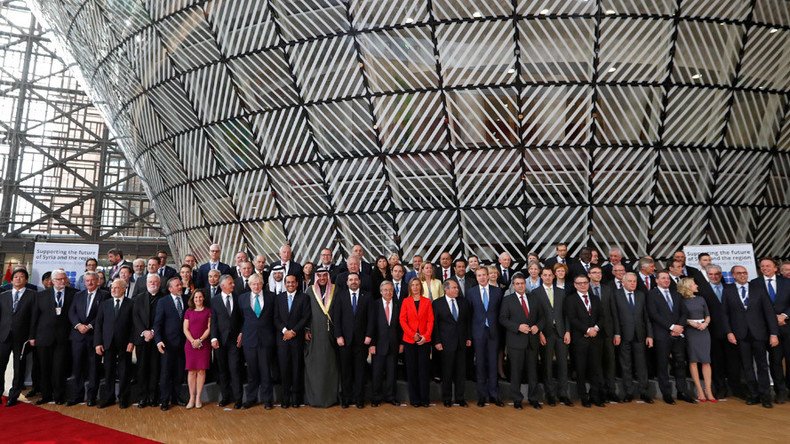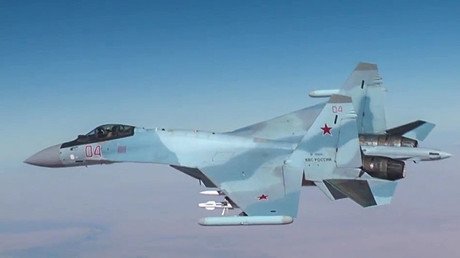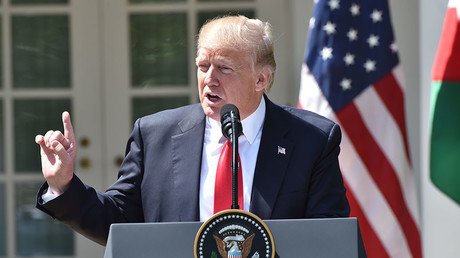Chem attack blame game ‘failed’ at Syria conference in Brussels – Russian envoy

Attempts by some members of the Brussels conference on Syria to redraw the agenda and focus on allegations of the Syrian government’s complicity in the suspected chemical attack in Idlib have failed, Russia’s deputy foreign minister has said.
“In what concerns this conference, of course, some tried to redirect it in order to focus attention on the incident that has occurred [in Idlib]. I must say that they failed to achieve that,” said Gennady Gatilov, Russia’s representative at the UN-sponsored international donor conference that was held on April 4-5 in Brussels.
Moscow hopes that the incident will not lead to the derailment of intra-Syrian talks as that would play into hands of those who strive to obstruct the peace process.
“Anything can affect the talks. But we would not like for such incidents to be used by opponents of the negotiation process to disrupt it,” the Russian diplomat said, stressing that it is necessary for the negotiations to be inclusive.
Despite the apparent discord at the conference, its participants were largely united in that there is no alternative to political settlement to the protracted military conflict.
“I would like to note that all spoke in favor of political solution, the majority agreed that there is no military solution,” Gatilov said, as cited by TASS. He added that “practically all hailed” the negotiations in Astana made possible by the mediation of Russia, Turkey and Iran and commended them as “great help” for the Geneva process.
No breakthrough has yet been achieved in the talks, Gatilov said, referring to the latest round of intra-Syrian negotiations that took place in Geneva last week.
“Regrettably, so far it has yielded no practical results but it is not the reason to say that the round failed. Obviously, it is going to be a long process and we had been saying this all the time,” Gatilov said.
The slow progress is due to major differences between the take of the Syrian government and rebels on an array of key issues, he said. The major point of disagreement between the sides is what topic should be given a priority in the talks. While opposition argues that the talks should pave way for a transitional government, the Syrian authorities insist on the preeminence of the fight against terrorism.
DETAILS: #chemicalweapons from #Idlib warehouse were then delivered to Iraq, repeatedly used there by militants https://t.co/AtMvAC61Mk
— RT (@RT_com) April 5, 2017
On Tuesday, a suspected chemical attack on the hospital in the town of Khan Sheikhoun in rebel-held Idlib province claimed the lives of dozens of people, including children. Rebel groups accused the Syrian government of mounting the attack, the claims which the Syrian authorities flatly denied.
READ MORE: Rebels ‘only people who benefited’ from Idlib chemical weapons attack – analyst
Russia has demanded a thorough investigation into the incident, saying it should be led by the Organization for the Prohibition of Chemical Weapons (OPCW), Russian Foreign Ministry spokeswoman Maria Zakharova said. The OPCW will be entrusted with collecting evidence of the attack within the fact-finding mission. The composition of the mission should be subject to approval by the UN Security Council.
In the aftermath of the attack, Russia’s Defense Ministry issued a statement, saying that the Syrian Air Force on Tuesday bombed a warehouse housing chemical weapons bound for Iraq. The storage facility, which was used to produce and store munitions containing toxic gas, was managed by the rebels. Defense Ministry spokesman Major-General Igor Konashenkov noted that the symptoms displayed by the victims of the attack in Khan Sheikhoun are similar to those shown by civilians who suffered in the Aleppo chemical attack, perpetrated by the militants.
The death of civilians has sparked an international outcry, with some of the Western governments, including the US, backing the allegations put forward by the rebels.
Commenting on the attack, US President Donald Trump said that it was “unacceptable” went “beyond the red line” and made him to rethink his stance on the Syrian government and President Bashar Assad.
In his turn, Vice President Mike Pence blamed the attack on a “failure of the past administration to both confront the mindless violence of the Assad regime and also hold Russia and Syria to account for the promises to destroy chemical weapons,” in an interview to Fox News on Wednesday.
READ MORE: We are compelled to take own action’ if UN fails in Syria – US envoy
Responding to a question, if Washington sees Moscow also responsible for the attack, Pence stated that Russian must ensure the implementation of the pledge by the Syrian government to destroy all chemical stockpiles, saying that “the time come has come for them [Russia] to keep the word that they made, to see the elimination of the chemical weapons so that they no longer threaten the people in that country.”
“We were told that there were an agreement between Russians and Assad to destroy chemical weapons and that the threat to civilians from a chemical attack had been eliminated, it was not,” Pence claimed.
WATCH MORE:














